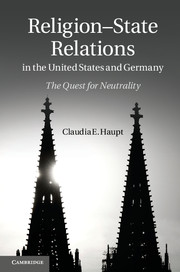Book contents
- Frontmatter
- Contents
- Acknowledgments
- Introduction
- Part I The Comparative Approach
- 1 The past and present of comparative constitutional studies
- 2 The culture wars, American exceptionalism, and a comparative analysis of religion–state relations
- 3 Employing a comparative approach
- Part II Religion–State Relations and the Role of Neutrality
- Index
- References
2 - The culture wars, American exceptionalism, and a comparative analysis of religion–state relations
from Part I - The Comparative Approach
Published online by Cambridge University Press: 05 January 2012
- Frontmatter
- Contents
- Acknowledgments
- Introduction
- Part I The Comparative Approach
- 1 The past and present of comparative constitutional studies
- 2 The culture wars, American exceptionalism, and a comparative analysis of religion–state relations
- 3 Employing a comparative approach
- Part II Religion–State Relations and the Role of Neutrality
- Index
- References
Summary
The current debate about comparative analysis in constitutional law must be seen in a larger societal context. Considering this societal perspective is important for two reasons. First, the “culture wars” thesis and American exceptionalism are frequently cited in the literature as reasons for the heated debate over comparative constitutional law and its references in the Supreme Court. Second, both discourses must also be considered in the study of neutrality in religion–state relations, because religion features prominently in both. Thus, these underlying discourses provide a shared backdrop for both the contemporary debate concerning comparative constitutional law generally and the comparative study of religion–state relations in particular. The role of religion in public life is considered a key “battleground” in the political debate over social issues sometimes called the “culture wars,” and assertions of American exceptionalism routinely include religion as an area fundamentally different in the United States, especially as compared to Europe.
This chapter addresses the “culture wars” and American exceptionalism discourses in turn, demonstrating first that the core of the “culture wars” is an elite discourse primarily targeted at political mass mobilization. Whether successful or not, it has been employed over a period of time to reach and activate the electorate on narrowly defined policy interests focused primarily on social issues. As such, the “culture wars” argument per se provides no principled basis for opposition to a comparative approach to constitutional questions. Importantly for this discussion, transdenominational religious alliances appear to have formed around certain issues, thus giving religion a key role in the wider “culture wars” discourse. American exceptionalism has two distinct facets: one is isolationist and one favors international engagement. The political dimension has to be kept in mind in the comparative discussion that follows. Assertions of religious exceptionalism feature prominently in the American exceptionalism literature, but again do not provide a principled argument against engaging in a comparative study of neutrality in religion–state relations. This chapter explores the roots of these discourses and demonstrates their current impact. As will be shown, the use of comparative constitutional inquiries in “culture war cases” may be an avenue of explaining the intensity of the debate and the vigorous opposition articulated by opponents. Indeed, several scholars consider it more likely that the outcome in those cases, rather than the practice itself, triggers such strong responses. Further, culture wars issues appear to be a primary target in contemporary criticisms of “judicial activism.”
- Type
- Chapter
- Information
- Religion-State Relations in the United States and GermanyThe Quest for Neutrality, pp. 40 - 63Publisher: Cambridge University PressPrint publication year: 2011



